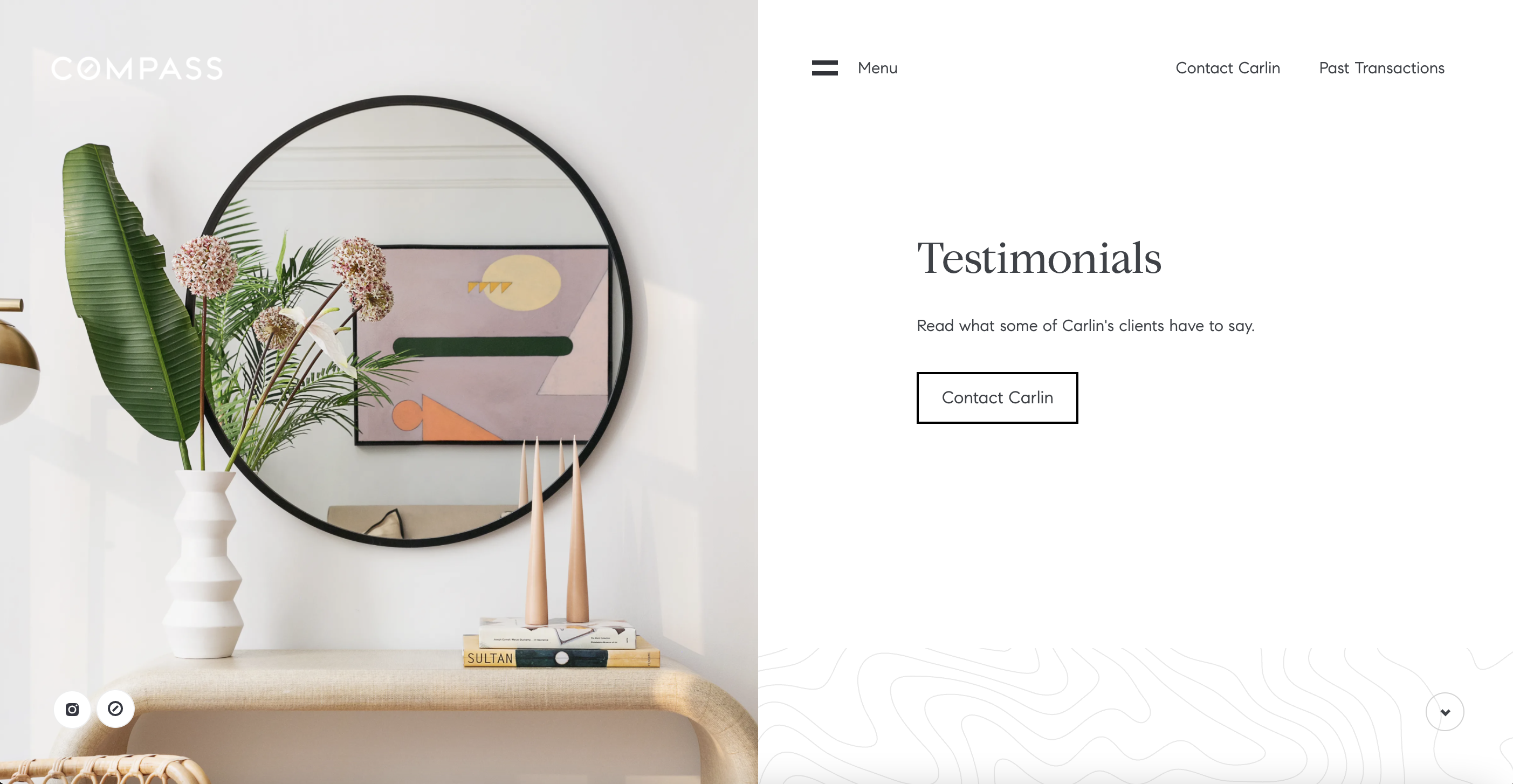SaaS vs. Owning Your Site
JULY 20, 2021
It can mean the difference between a full client load and an empty calendar.
Although the advice to choose a niche as a real estate agent is quite common, many new professionals don’t do so. Whether it’s due to the fear of making the wrong decision, a lack of understanding of the market, or a lack of faith in the “why” behind the advice, very few realtors start off strong with a niche.
However overwhelming the choice may be, it’s well worth it. The importance and impact of strategically choosing — and marketing to — a specific real estate niche simply cannot be understated.
What is a Niche?
A niche is a subset of the market you will focus on in your business. Choosing a niche means defining the specific group of people or types of properties that you will zoom in on as a real estate professional.
Endless niche options exist for realtors because niches can be narrowed down based on the types of properties you focus on, on location, or on qualities of a subset of clients. For example, some realtors specialize in working with first-time homebuyers or clients who are actively serving in the military.
Others zoom in on luxury real estate, mountain homes, farms, or oceanfront properties. The options are endless, and there are no wrong answers; what matters is getting clear about what your specialty is and who you serve!
Why Choose a Niche?
Choosing a niche or specifying a niche is often called “niching down” and can feel counterintuitive at first. Anyone in professions meant to serve people, realtors included, naturally tend to believe that the best approach to their business is to help anyone and everyone. After all, why would you want to “rule out” any portion of the population that’s in search of a realtor?
In reality, instead of ruling people out, strategically choosing a niche means you draw the right people in. Choosing a niche helps you position yourself strategically and intentionally to potential clients — the right potential clients for you. When you get specific about who you serve and how to do so, you instantly stand out from the sea of qualified real estate agents in your area.
What you need to know about your options
when it’s time for a new website.
What you need to know about your options when it’s time for a new website.
As a real estate agent, your website is one of your most important assets. The world
of website design, hosting, and maintenance has changed over the years, and if you
have not had a new website recently, you may not be aware of what is available. In
the past, most agents purchased a website from a marketing agency or designer,
paid to have it hosted, then paid for any updates or maintenance that needed to
be done. Today, there is an alternative to that called Software as a Service that
might be a better fit for your needs. Here is the difference between SaaS and
owning your site and how to decide which is right for you.
What Happens When You Buy a Website?
When you buy a website, you are basically contracting with a designer or website
agency to create a site for you. In addition to a large upfront cost, you will also have
to pay for the domain and for hosting the site. Once the site is built, the company’s
obligations are over. You will own the site, but you will have to keep paying for hosting.
Unless you’re on some type of maintenance contract, you won’t have any support
when it comes to keeping your site up to date and running properly. You will be
responsible for adding or changing content, adding or removing listings, and keeping
all your plugins and links working properly.
After a certain amount of time, your site will start to look outdated or not perform as
well as it used to. At this point, you will likely have to go back to the original designer
or choose a new one and either pay a significant amount to have your site completely
revamped or start from scratch with a new site.
What Happens When You Use SaaS for Your Website?
When you work with a company that offers SaaS for websites, you don’t have to pay
a large upfront cost to have your site built. Instead, you will be able to leverage
already-existing designs and will only need to pay for the customizations you need
to make the site your own, complete with unique branding, colors, and a layout that
fits your unique needs. In addition to the site, you will also get a team of experts who
are there to help you every step of the way. This includes customizing your site to your
needs, providing support after your site is finished that includes any necessary
updates or fixes, and answering any of your site-related questions.
Benefits of SaaS
There are numerous benefits of working with a company who offers SaaS to build your
website. They include:
■ Lower costs. Because you are leveraging an existing template, your upfront cost will
be much lower compared to buying a new site. Hosting fees are also included, and you
won’t have to pay to have someone update your site, add content, or ensure all your
links and plugins are up to date.
■ Expert support. Have questions about how to use your site? Want to add the bio and
image of a new team member? Notice that a link no longer goes where it needs to?
When you work with a company that provides SaaS, you get a team of pros to help
you every step of the way.
■ A site that grows with you. Sites provided by SaaS companies are dynamic. Unlike
an owned website that can easily become outdated, your SaaS site will grow as your
agency grows. New team members, updated branding, added services, and new
features can all be added as needed, ensuring your site will never become obsolete.
How to Choose an SaaS Provider
Of course, not every SaaS provider will give you a seamless, stress-free experience
when creating and maintaining your site. Choosing the right provider is an
important step in the process and it pays to know what to look for. Here are
some tips to help you out:
■ Choose a provider with experience. Brand new agencies may have flashy branding
or catchy taglines, but look a little closer to see how much experience they have
creating SaaS sites. The more experience they have, the more likely they are to still
be around for years into the future when you need them.
■ Choose a provider that specializes in real estate. Realtors have unique needs
when it comes to marketing, and no one knows this better than an agency that
works with only agents. When you choose an agency that specializes in your
industry, you’ll benefit from a team that knows exactly what it takes to make
you successful.
■ Choose a provider who is easy to communicate with. You need to be able to talk
with the members of the agency to tell them exactly what you want, need, and expect
out of a site. You also need pros on your side who are responsive to questions, know
how to explain things to you in plain terms, and put your needs first.
■ Choose a provider who offers other services. Your website is the core of your
marketing plan. If your provider can build other marketing strategies around it,
you will be one more step ahead of your competition. A robust agency who offers
SaaS as well as lead generation, database, and social media marketing solutions
will be able to create a cohesive plan that delivers results.
■ Choose a provider with no hidden costs. Everything you will need to pay for your
site should be discussed upfront. Hidden fees or other costs that aren’t discussed
before you sign the contract are signs of a disreputable agency.
Do you need a new website for your real estate business? Consider taking
advantage of where the technology industry is headed and work with an SaaS
provider for a dynamic site that grows with you. Want to take the next step?
Reach out to the team at Luxury Presence so we can tell you about our SaaS
services.
As a real estate agent, your website is one of your most important assets. The world of website design, hosting, and maintenance has changed over the years, and if you have not had a new website recently, you may not be aware of what is available. In the past, most agents purchased a website from a marketing agency or designer, paid to have it hosted, then paid for any updates or maintenance that needed to be done. Today, there is an alternative to that called Software as a Service that might be a better fit for your needs. Here is the difference between SaaS and owning your site and how to decide which is right for you.
What Happens When You Buy a Website?
When you buy a website, you are basically contracting with a designer or website agency to create a site for you. In addition to a large upfront cost, you will also have to pay for the domain and for hosting the site. Once the site is built, the company’s obligations are over. You will own the site, but you will have to keep paying for hosting. Unless you’re on some type of maintenance contract, you won’t have any support when it comes to keeping your site up to date and running properly. You will be responsible for adding or changing content, adding or removing listings, and keeping all your plugins and links working properly.
After a certain amount of time, your site will start to look outdated or not perform as well as it used to. At this point, you will likely have to go back to the original designer or choose a new one and either pay a significant amount to have your site completely revamped or start from scratch with a new site.
What Happens When You Use SaaS for Your Website?
When you work with a company that offers SaaS for websites, you don’t have to pay a large upfront cost to have your site built. Instead, you will be able to leverage already-existing designs and will only need to pay for the customizations you need to make the site your own, complete with unique branding, colors, and a layout that fits your unique needs. In addition to the site, you will also get a team of experts who are there to help you every step of the way. This includes customizing your site to your needs, providing support after your site is finished that includes any necessary updates or fixes, and answering any of your site-related questions.
Benefits of SaaS
There are numerous benefits of working with a company who offers SaaS to build your website. They include:
■ Lower costs. Because you are leveraging an existing template, your upfront cost will be much lower compared to buying a new site. Hosting fees are also included, and you won’t have to pay to have someone update your site, add content, or ensure all your links and plugins are up to date.
■ Expert support. Have questions about how to use your site? Want to add the bio and image of a new team member? Notice that a link no longer goes where it needs to? When you work with a company that provides SaaS, you get a team of pros to help you every step of the way.
■ A site that grows with you. Sites provided by SaaS companies are dynamic. Unlike an owned website that can easily become outdated, your SaaS site will grow as your agency grows. New team members, updated branding, added services, and new features can all be added as needed, ensuring your site will never become obsolete.
How to Choose an SaaS Provider
Of course, not every SaaS provider will give you a seamless, stress-free experience when creating and maintaining your site. Choosing the right provider is an important step in the process and it pays to know what to look for. Here are some tips to help you out:
■ Choose a provider with experience. Brand new agencies may have flashy branding or catchy taglines, but look a little closer to see how much experience they have creating SaaS sites. The more experience they have, the more likely they are to still be around for years into the future when you need them.
■ Choose a provider that specializes in real estate. Realtors have unique needs when it comes to marketing, and no one knows this better than an agency that works with only agents. When you choose an agency that specializes in your industry, you’ll benefit from a team that knows exactly what it takes to make you successful.
■ Choose a provider who is easy to communicate with. You need to be able to talk with the members of the agency to tell them exactly what you want, need, and expect out of a site. You also need pros on your side who are responsive to questions, know how to explain things to you in plain terms, and put your needs first.
■ Choose a provider who offers other services. Your website is the core of your marketing plan. If your provider can build other marketing strategies around it, you will be one more step ahead of your competition. A robust agency who offers SaaS as well as lead generation, database, and social media marketing solutions will be able to create a cohesive plan that delivers results.
■ Choose a provider with no hidden costs. Everything you will need to pay for your site should be discussed upfront. Hidden fees or other costs that aren’t discussed before you sign the contract are signs of a disreputable agency.
Do you need a new website for your real estate business? Consider taking advantage of where the technology industry is headed and work with an SaaS provider for a dynamic site that grows with you. Want to take the next step? Reach out to the team at Luxury Presence so we can tell you about our SaaS services.

Database Marketing Strategies
The Importance of Your Website as a Realtor
Why is Your Database So Important?
Your database is your key to staying in touch with those who may do business with you or who are likely to give you referrals. If you don’t have a way of keeping in touch with them and engaging with them, they will likely forget about you and their business (or referrals) will go elsewhere.
While many agents think they can keep track of those they need to touch base with by retaining their business cards, writing them down in their planner or simply remembering who they are, most are not organized and disciplined enough to do so. They need to rely on a system that involves not only building their database, but also effectively using that database to develop marketing campaigns that can include email newsletters, text campaigns, phone calls, or social media marketing strategies.
Some real estate agents decide to split their databases into two distinct groups: a lead generation group that includes only those who the realtor is attempting to gain as clients, and a sphere of influence group that includes past clients, networking and referral partners, and others who are likely to pass their names on to others who need a real estate agent. While both of these types of databases are useful, most agents find they get more business from their sphere of influence group than their lead generation group — especially if they are not using a professional, unique lead gen system.
What Mistakes Do Agents Make When Building Their Database?
Many agents suffer from “shiny object syndrome” when it comes to building their database. Instead of playing the long game and focusing on ways to slowly build their database with solid leads and close spheres of influence, they jump on the latest and greatest marketing trend and shift their efforts to a strategy they think will make them some quick sales. Unfortunately, a change in algorithm or other occurrences out of your control can easily put an end to the effectiveness of trendy marketing techniques. When you focus on building a solid database, you’ll insulate your business from external changes and reap the benefits a few years down the line when your list pays dividends and your income skyrockets.
Other agents do a good job of building a strong database, but then fail to utilize it by not creating a robust marketing strategy connected to it. Compiling the names is only part of the battle. The more important component is developing a system that consistently engages those in your database to keep them up to date and interested in what you are currently doing. Your system also needs to have “triggers” to let you know when someone in your database is at a stage where they might make the decision to work with you or pass on a referral so you can follow up with a phone call or an in-person meeting.

The Wrong Messaging
Build and Market to Your Database
As a realtor, your database is your best friend. This is your list of past, current, and prospective clients as well as referral sources who can help grow your business. A basic rule of thumb is that an effective database consists of around 1000 names and contact information. Once you’ve built a solid database, you can market to your contacts through regular email newsletters, texts, or personal invitations to events or open houses. The marketing you do to your database should follow the same guidelines as your social media marketing: keep content informational and helpful rather than salesy. This keeps your contacts engaged with your brand and ensures they will continue to pay attention to what you have to say even when they are not actively looking to buy or sell real estate.
Harness the Power of Social Proof
The theory of social proof states that people are likely to conform and copy the actions of those in their peer group or those they view as experts or who are trustworthy. When it comes to real estate marketing, you can take advantage of social proof by featuring testimonials on your site and social media, soliciting online reviews from those you’ve done business with, and by establishing yourself as an authority on the local real estate market with helpful, informative content. When you harness the power of social proof, you essentially have others selling for you and no longer have to hustle or chase leads.

2. Links to Active Social Media Profiles
Having a strong social media presence shows your
potential clients that you are up to date, active in the
industry, and committed to connecting with those you
work with. To make it easy for your website visitors to
connect with you on social media, make sure you add
links to each of the platforms you are on.

2. Links to Active Social Media Profiles
Having a strong social media presence shows your
potential clients that you are up to date, active in the
industry, and committed to connecting with those you
work with. To make it easy for your website visitors to
connect with you on social media, make sure you add
links to each of the platforms you are on.
Database Marketing Strategies

The Right Messaging

Now that you understand that talking yourself and your accomplishments up on your site is the wrong messaging, let’s take a look at the content that works. Here are some tips on creating messaging that resonates with your target audience:
Content that is helpful. What are the issues your ideal client is dealing with? Are they attempting to buy and sell homes at the same time and need assistance with financing a down payment? Are they struggling to find a home they are interested in due to low inventory? Are they trying to decide if they should relocate or buy a second home now that they are empty-nesters? Identify the pain points in your target market, then address those points through blog posts that you then share on social media and in newsletters that go out to your database.
Content that establishes you as an expert. Those looking for help buying or selling property want to work with the best. To show that you are an expert in your local community and industry, develop content that revolves around neighborhood events, local real estate news, and other industry issues.
Content from experts and past clients. When you use the power of social proof to develop your website content, you let others do the selling for you. Social proof is the phenomenon where others copy the actions of people they see as peers or as trusted individuals. If they see your past clients talking about your high level of customer service in a video testimonial or read reviews from experts in the industry who have worked with you, they will be more likely to choose you as their realtor.
Content that stays ahead of the game. Your ideal client wants to know what’s going on in the industry as soon as possible. They also don’t want to read the same old content on your site that they’ve read on all your competitors’ sites. To address these needs, stay on the cutting edge of the industry and share information your visitors can’t get anywhere else.
Components of an Effective Lead
Generation System


How the Right Messaging Increases Conversions
Additionally, choosing a niche allows you to optimize your time and deep-dive into the knowledge and skills needed to best serve your clients. There are countless nuances, specialized documents, and small bits of information that are pertinent to any niche, and trying to serve all niches equally well can quickly lead to burnout.
For example, realtors who specialize in helping military families can serve them best by learning all there is to know about VA loans and the best local lenders. On the other hand, if you’re a “generalist” and only take on one or two military clients each year, it’s likely that you’ll end up doing research on VA loans on the fly without being able to do a true deep dive. Choosing a niche frees up your time and energy while also allowing you to provide the very best service to your clients.
While remaining general and marketing yourself as a great real estate agent can work to bring in clients, you instantly cut through the noise when you position yourself as a specialist for a particular type of transaction, home, or person. Many people know what they want out of their real estate experience, so quickly identifying yourself as someone who can provide that specific result will go a long way in filling your inbox with qualified leads.
Choosing a niche and producing online content focused on that niche will also boost your SEO considerably, making it much easier for anyone searching the internet to discover you. SEO for realtors can work as an ongoing source of leads and revenue without much manual effort.
Once you’ve narrowed down your target market and begun producing content relevant to them, your web content will rise to the top when prospects search the internet for the solutions to their problems! As great as it feels to receive a referral or recommendation from a former client, optimizing your web presence will prevent you from leaving money on the table when clients without connections go to search for an agent.
Beyond that, niching brings some ease into your marketing and processes. It’s much easier to create relevant content and provide value when you know who you’re talking to! You’ll quickly establish yourself as an expert in your niche, even if you’re new to the real estate profession.

LATEST POST
Learn the latest marketing and tech trends from our
marketing gurus and contributing industry experts.

NOVEMBER 30, 2021
HOW TO SET UP A TESTIMONIAL-GENERATION SYSTEM IN YOUR BUSINESS

NOVEMBER 16, 2021
6 WAYS YOU CAN DEMONSTRATE YOUR EXPERTISE WITH SOCIAL MEDIA

FOR THE 2ND YEAR IN A ROW, LUXURY PRESENCE RANKS NO. 598 ON THE 2021 INC. 5000
NOVEMBER 11, 2021
THE POWER OF FORMING STRATEGIC PARTNERSHIPS WITH REFERRAL PARTNERS


